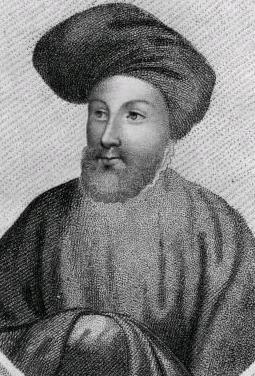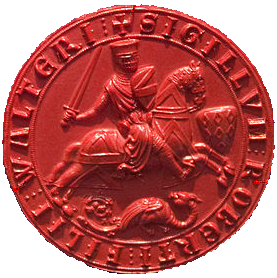Walter FitzWalter, 4th Baron FitzWalter (according to some sources 5th Baron Fitzwalter) (September 5, 1368 - May 16, 1406) was an English nobleman. [1]
Contents
FitzWalter challenges Edward, Duke of Aumale. Historicizing depiction from 1864
Walter FitzWalter, 4th Baron FitzWalter (according to some sources 5th Baron Fitzwalter) (September 5, 1368 - May 16, 1406) was an English nobleman. [1]
FitzWalter challenges Edward, Duke of Aumale. Historicizing depiction from 1864
Walter FitzWalter came from the noble FitzWalter family. He was the second son of Walter FitzWalter 3rd Baron Fitzwalter and his wife Eleanor Dagworth. His older brother Robert predeceased him. His father died in 1386, making him heir to his estates in Essex and other parts of England. However, since his stepmother Philippa Mohun had a claim to a third of her husband's estate as a widow, his inheritance was greatly reduced. She survived him and did not die until 1431. [2]
In contrast to his ancestors, FitzWalter served less in the military and was primarily politically active. As Baron FitzWalter, he took part in parliaments, allying himself with Thomas of Woodstock, Duke of Gloucester, under whom his father had served in the Hundred Years' War. His castle at Pleshey was close to his estates of Woodham Walter and Henham. [3] In February 1395 he accompanied Gloucester when he traveled to Ireland on behalf of King Richard II. Gloucester died in 1397 under uncertain circumstances. On October 18, 1399, during the first parliament of the new King Henry IV, Fitzwalter accused Edward of Norwich, Duke of Aumale, his stepfather, of the murder of Gloucester and challenged him to single combat. [4] This was stopped by the king, but it was not until 1401 that FitzWalter and Edward of Norwich formally reconciled. Due to Owain Glyndwr's rebellion in Wales, the king commissioned him in 1403 to fortify Dorstone Castle on the border with Wales. In his homeland of Essex, however, FitzWalter did not appear politically and did not take up any office. During a trip to Italy, FitzWalter was captured by Saracen corsairs between Rome and Naples. He was brought to Tunis and only released by Genoese merchants after a long period of captivity. Weakened by the privations of captivity, he died in Italy. [5]
FitzWalter had married Joan Devereux, (1379–1409), a daughter of John Devereux 1st Baron Devereux and Margaret de Vere, before April 1390. [1] After the childless death of her brother John in 1396, his wife inherited his estate. He had at least two children with her:
After FitzWalter's death, his widow married Hugh Burnell, 2nd Baron Burnell. [2]

Edward, 2nd Duke of York, was an English nobleman, military commander and magnate. He was the eldest son of Edmund of Langley, 1st Duke of York, and a grandson of King Edward III of England. He held significant appointments during the reigns of Richard II, Henry IV, and Henry V, and is also known for his translation of the hunting treatise The Master of Game. He was killed in 1415 at the Battle of Agincourt, whilst commanding the right wing of the English army.

Thomas of Woodstock, Duke of Gloucester was the fifth surviving son and youngest child of King Edward III of England and Philippa of Hainault.

Thomas Holland, 1st Duke of Surrey, 3rd Earl of Kent, KG, Earl Marshal was an English nobleman and courtier.

Baron FitzWalter is an ancient title in the Peerage of England. It was created on 24 June 1295 for Robert FitzWalter. The title was created by writ, which means that it can descend through both male and female lines.
The County of Aumale, later elevated to a duchy, was a medieval fief in Normandy, disputed between France and England during parts of the Hundred Years' War.

John Devereux, 1st Baron Devereux, KG, was a close companion of Edward, the Black Prince, and an English peer during the reign of King Richard II.

Anne of Gloucester, Countess of Stafford was the eldest daughter and eventually sole heiress of Thomas of Woodstock, 1st Duke of Gloucester, by his wife Eleanor de Bohun, one of the two daughters and co-heiresses of Humphrey de Bohun, 7th Earl of Hereford, 6th Earl of Essex (1341–1373) of Pleshey Castle in Essex.

Robert Fitzwalter was one of the leaders of the baronial opposition against King John, and one of the twenty-five sureties of Magna Carta. He was feudal baron of Little Dunmow, Essex and constable of Baynard's Castle, in London, to which was annexed the hereditary office of castellan and chief knight banneret of the City of London. Part of the official aristocracy created by Henry I and Henry II, he served John in the wars in Normandy, in which he was taken prisoner by King Philip II of France and forced to pay a heavy ransom.

The Epiphany Rising was a failed rebellion against King Henry IV of England in early January 1400.
Philippa de Mohun was Duchess of York, as a result of her third marriage to Edward of Norwich, 2nd Duke of York (c.1373–1415), Lord of the Isle of Wight, a grandson of King Edward III (1327–1377). She succeeded her third husband as Lady of the Isle of Wight (1415–1431).

Richard de Vere, 11th Earl of OxfordKG was the son and heir of Aubrey de Vere, 10th Earl of Oxford. He took part in the trial of Richard, Earl of Cambridge, and Lord Scrope for their part in the Southampton Plot, and was one of the commanders at Agincourt in 1415.
Joan FitzAlan, Countess of Hereford, Countess of Essex and Countess of Northampton was the wife of the 7th Earl of Hereford, 6th Earl of Essex and 2nd Earl of Northampton. She was the mother of Mary de Bohun, the first wife of Henry of Bolingbroke who later reigned as King Henry IV, and Eleanor de Bohun, Duchess of Gloucester. She was the maternal grandmother of King Henry V.

John Montagu, 3rd Earl of Salisbury and 5th and 2nd Baron Montagu, KG was an English nobleman, one of the few who remained loyal to Richard II after Henry IV became king.
Sir Walter Devereux of Bodenham and Weobley was a prominent knight in Herefordshire during the reigns of Richard II and Henry IV. He represented Hereford in Parliament, and gave rise to the Devereux Earls of Essex and Viscounts of Hereford.
Sir William Devereux of Bodenham was a prominent knight in Herefordshire during the reign of Edward III, and an important member of the retinue of the Earls of Hereford. He is the ancestor of the Devereux Earls of Essex and Viscounts of Hereford.
Stephen Devereux of Bodenham and Burghope was a member of a prominent knightly family in Herefordshire during the reigns of Edward I, Edward II and Edward III. An important retainer of the de Bohun Earls of Hereford, he gave rise to the Devereux Earls of Essex and Viscounts of Hereford.
Sir Richard Hankford (1397-1431) was an English landowner and soldier from Devon.
Sir Walter Devereux of Bodenham was a member of a prominent knightly family in Herefordshire during the reigns of Edward I, and Edward II. He gave rise to the Devereux Barons of Whitchurch Maund, Earls of Essex and Viscounts of Hereford.

Walter FitzWalter, 7th Baron FitzWalter was an English soldier and nobleman.
{{cite book}}: CS1 maint: location missing publisher (link)